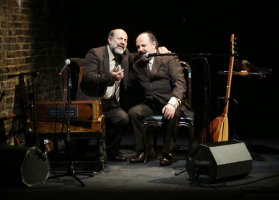
Kelly Aliano
|
Keeping Count
Review: "Rumore di acque (Noise in the
Waters)" At its finest, theatrical storytelling can force its audiences to confront issues that they might otherwise ignore, even without those spectators realizing what is happening. At its worst, telling tales is nothing more than a confrontational presentation of an individual’s point of view without much context or explanation. In “Rumore di acque (Noise in the Waters)” by Italian company Teatro delle Albe, currently playing at La MaMa, the narrator strives for the former while often falling into the trap of the latter. The production is at times fascinating to watch, but at others is either too didactic or too abstract for its own good. To cite a plot of the play would be disingenuous to the work that writer/director Marco Martinelli has devised with Ermanna Montanari. Rather, the extended monologue, performed by Alessandro Renda, is more a musing on a complicated theme. Much of the text centers around numbers as well as on nautical iconography. The connection between the two emerges: how does one number the many lost at sea in the attempt to escape to a better life only to find oneself trapped in worse circumstances? The tales of specific people, usually young Africans attempting to escape their lives by fleeing to Sicily only to find themselves victims of human trafficking, are harrowing. But specifics are often obscured by abstractions; there is a great deal of poetry, particularly surrounding the presentation of the numbers themselves. Divining meaning of individual lines seems less the point than experiencing the sum total of all of the elements presented.
This alienation is further complicated by the fact that much of the text is presented in Italian with English supertitles, by translator Thomas Simpson. It is easy to follow the words, as they are positioned right above the performer center stage, yet because the play is made of little beyond Renda’s speechifying, the scenic picture becomes a tad one-note. The musical accompaniment is the production’s highlight; the original music by Fratelli Mancuso is both haunting and powerful. It perfectly underscores Renda’s tour-de-force monologue performance. Neither the lighting nor the scenic design, both by Montanari and Enrico Isola, do much to break up the dark and ominous mood of the production. Things begin in the dark grays of the dirty landscape and finish there as well. Although the issues that the piece grapples with are important and relevant ones, it is hard not to feel as though the narrator is speaking at you as opposed to speaking to you. There is little in-road for an audience member into the world of this play, making these all-too-real problems seem like something over there that does not affect us. Perhaps if there were some internal story that we were following, it would be easier to identify with the problems at work here. In its current construction, although a compelling performance to watch with some important points to make, “Noise in the Waters” is barely more than a distant cry, one that makes it impossible to take note or keep count of all who have been lost because of the terrible situations that it discusses. |
| museums | NYTW mail | recordings | coupons | publications | classified |


